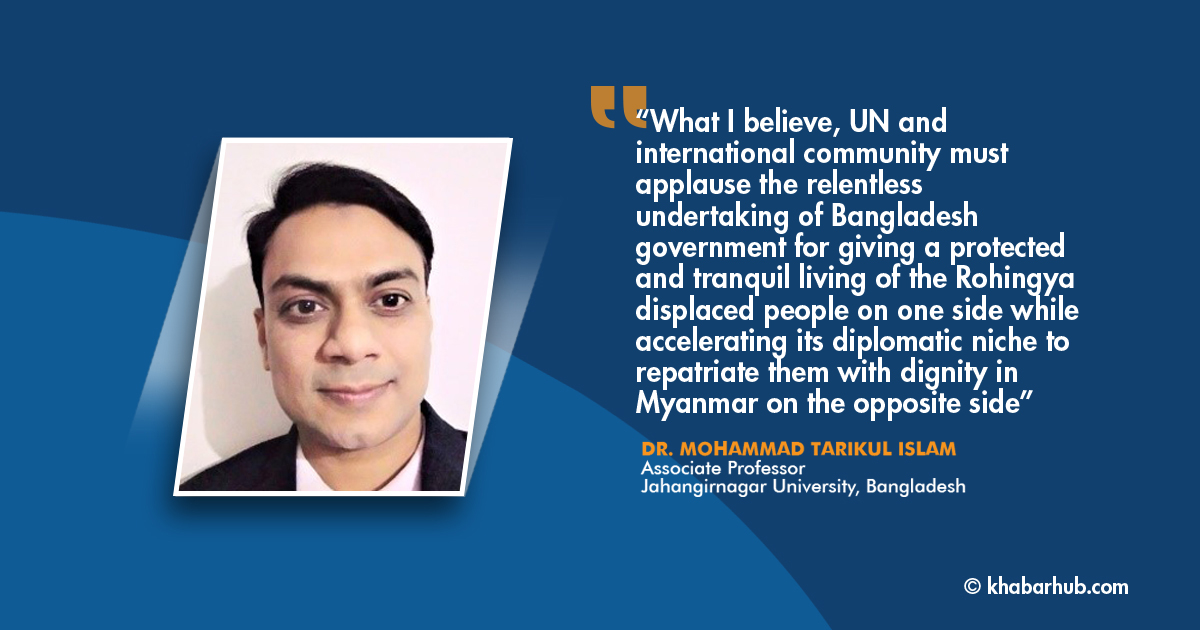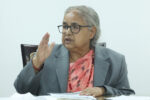As part of its plan to shift 100,000 Rohingyas from the crowded camps in Cox’s Bazar, the Government of Bangladesh transferred 1,642 Rohingyas to Bhashan Char (island) on December 4, 2020.
As indicated by the media reports, there are some particular favorable circumstances of those locales over Bhashan Char.
The destinations are found generally in level land in an eight-kilometer stretch of the west of Kutupalong-Balukhai Expansion Camp between the super camp and the coast. Those fall inside the regulation zone that the public authority has assigned to restrict the free development of Rohingyas.
Another preferred position is that occupants there would appreciate close geological nearness of the super camp where different evacuees are based.
The locales would likewise be generally near the boundary with Burma and will keep the evacuees’ expectation alive to return there in the closest conceivable time.
Due to persecution, the Rohingya, an ethnic minority group in Myanmar crossed into neighboring Bangladesh over decades, laying uneven pressure on the scarce resources of Bangladesh.
The efforts of the Government of Bangladesh in tackling the spread of the COVID-19 pandemic in the largest camp in the world were also recognized.
At present, Bangladesh is hosting around one million Rohingya refugees. Rights groups and the international community have condemned the migration, saying it is low-lying land, yet the public authority said all the assurance measures were set up in Bhashan Char.
The issue drew more noteworthy worldwide consideration with 700 thousand Rohingya escaping their nation and intersection the boundary to Bangladesh three years prior now inside a range of only a couple months.
Consequently, the Rohingya displaced person emergency is not anymore a homegrown or inward matter of Myanmar; rather, it is currently perhaps the most pivotal worldwide emergencies.
It’s appreciable as the Ambassador and Permanent Representative to the Permanent Mission of Bangladesh to the United Nations in a virtual discussion with UN High Commissioner for the Refugees (UNHCR) Filippo Grandi presented the rationale of Rohingya relocation to the housing project on the island under Hatiya Upazila of Noakhali district in Bangladesh.
Despite Bangladesh’s sincere efforts, Rohingya repatriation could not be started in more than three years after some 750,000 Rohingyas fled a brutal military crackdown in Myanmar’s Rakhine State.
The reality suggests that the presence of about a million Rohingyas in limited space has become risky. It left the local livelihood, environment and socio-economic situation under threat. There were also security challenges in the crowded camps.
As the process to shift the Rohingyas from Bangladesh’s Cox Bazar to Bhashan Char starts, a feeling of energy has spread among the outcasts, who are looking for “harmony, solace and decent lodging”.
I was perusing the meeting of Rohingya individuals who have moved to the Bashan Char intentionally. Mahmuda Khatun is one of them who informed the Daily Star (popular English dailies of Bangladesh) regarding the motivation behind why she has moved to the Bashan burn.
“We needed to live under canvas in the camps in Cox’s Bazar in a lot of warmth and among such a large number of individuals. We were unable to wash and endured without question and Bhashan Char has working to live in and different offices, we will discover solace and harmony there. That is the reason I am going there on my own will,” Mahmuda said.
While repeating comparable assessments, the Rohingya outcasts have underscored that their choice to move isn’t because of any pressing factor from the public authority specialists.
The outcasts further said that there was a ton of disagreement among individuals and “almost no extension for work or appropriate instruction” in the Cox’s Bazar evacuee camps.
According to a significant number of them, there was distress in the camps and such a large number of battles used to occur.
Earlier, Foreign Minister Dr AK Abdul Momen had said in an explanation that the public authority won’t compel the Rohingyas to move to Bhashan Char.
As per the Minister, the public authority isn’t taking Rohingyas to Bhashan Char persuasively. The public authority is taking the individuals who are happy to go. They are going to Bhashan Char consciously and own choice.
Although, the UN and different rights groups asserted that they have restricted data about the thing that has been going on and that the public authority still can’t seem to permit a specialized group to evaluate the possibility of the lodging project in Bhashan Char.
UN and rights groups have been scrutinizing the possibility of migration to Bhashan Char, saying it is a low-lying secluded island and has dangers of flooding, however at a point a year ago consented to send a specialized group to survey the condition and mentioned the public authority to permit the visit before movement.
The UN additionally said any movement ought to be deliberate and all insurance estimates should be set up.
Considering the reality, the UN and international community should appreciate the relentless undertaking of the Bangladesh government for giving a protected and tranquil living of the Rohingya displaced people on one side while accelerating its diplomatic niche to repatriate them with dignity in Myanmar on the opposite side.
To address the risks of a potential outbreak of coronavirus in the camps, the Government of Bangladesh, together with UNHCR and partners, has ensured the inclusion of Rohingya refugees in its national response.
A resolution was adopted by the United Nations, calling for an urgent solution to the protracted Rohingya crisis that has affected Bangladesh adversely. In total, 132 countries voted in favor of the resolution, while 9 countries voted against it, and 31 countries abstained on 18 November 2020.
The resolution “The Situation of Human Rights of the Rohingya Muslims and other minorities in Myanmar”, co-tabled by the OIC and the EU received sponsorship from 104 member States and demonstrated strong and unified support in favor of the persecuted Rohingya Muslims and other minorities, who continue to suffer from human rights violations in Myanmar.
In 2020, the resolution had taken some new developments into account, such as the provisional order of the International Court of Justice, initiation of an investigation by the International Criminal Court and the issue of continued disenfranchisement of the Rohingya and other minorities, who were barred from participating in the recent general elections in Myanmar.
The resolution also expressed deep appreciation towards the Government of Bangladesh, which has demonstrated exemplary humanitarian gesture by sheltering and protecting the Rohingyas.
The efforts of the Government of Bangladesh in tackling the spread of the COVID-19 pandemic in the largest camp in the world were also recognized.
The resolution called on the international community to support Bangladesh in its humanitarian endeavor. Even, in its 43rd session, UNHRC adopted the resolution on 22 June 2020 by a vote of 37 in favor, 2 against and 8 abstentions, calling upon Myanmar to ensure voluntary, safe and dignified return of Rohingya refugees.
It is evident that mostly located in Teknaf-Cox’s Bazar areas, the refugee earmarked areas are adjacent to the local settlements, which has resulted in law and order situations.
Security concern particularly non-conventional (human security), is another challenge that Bangladesh is already facing and it will intensify further in the future with the influx of more Rohingya refugees.
The international community believes; only harmonious returns can break the decades-long cycle of displacement the Rohingya community is experiencing.
Bangladesh government has been accredited for providing them with various facilities, including shelter, food and medical care despite many limitations.
To address the risks of a potential outbreak of coronavirus in the camps, the Government of Bangladesh, together with UNHCR and partners, has ensured the inclusion of Rohingya refugees in its national response.
Even in its 43rd session, the UNHRC had adopted the resolution on 22 June 2020 by a vote of 37 in favor, 2 against and 8 abstentions, calling upon Myanmar to ensure voluntary, safe and dignified return of Rohingya refugees.
Bangladesh is making every effort in a professional fashion to harness regional and global power to end in an amicable solution to this emerging crisis despite the position of China and India on the side of Myanmar on the Rohingya issue. We have noticed both countries are having a huge strategic and economic interest in Myanmar.
Even Russia seems compassionate to Myanmar on this issue. Bangladesh’s government has been experienced over the months while unveiling their diplomatic efforts in persuading Myanmar to repatriate the refugees.
Though Myanmar holds no major importance in Russian policy – no geopolitical interests are at stake there, while Moscow’s attitude to the issue in the UN could potentially upset its Muslim allies, for instance, Iran.
However, the reality suggests that the Bangladesh government may not succeed in sending all of them back even in a single go with the utmost diplomatic niche. Therefore, we may think of some long-term solutions to deal with this additional population in Bangladesh.
South Asian countries must show solidarity with Bangladesh and support Myanmar to start creating conditions for the voluntary, safe and dignified return of Rohingya refugees.
Bangladesh is making stringent efforts to harness regional and global power support to find an amicable solution to this emerging crisis, despite the positions taken by China and India on the side of Myanmar on the Rohingya issue as both countries are having huge strategic and economic interests in Myanmar.
Even Russia seems tilted towards Myanmar on this issue. Though Myanmar holds no major importance in Russian policy – no geopolitical interests are at stake there, Moscow’s attitude to the issue in the UN could potentially upset its Muslim allies, for instance, Iran.
The international community believes; only harmonious returns can break the decades-long cycle of displacement the Rohingya community is experiencing.
Memorandum of Understanding (MoU) signed in 2018 between the Government of Myanmar, UNHCR and UNDP are intended to ensure that refugees receive information on the situation in their places of origin and this MoU keeps a provision allowing Rohingya refugees to visit their home villages and other areas where they may choose to return.
Moreover, to help Myanmar create conditions favorable for the Rohingyas to return, the UNDP and UNHCR signed a tripartite deal with Myanmar in June 2018, nearly a year after 740,000 Rohingyas fled military atrocities in Rakhine, which was described as having “genocidal intent” by UN independent investigators.
The official visit of the Prime Minister of Bangladesh to China in early July 2019 was important as China assured its support to Bangladesh in the repatriation of the Rohingyas.
China expressed its interest to help Bangladesh in resolving the Rohingya crisis by convincing the Myanmar government and its leaders through bilateral discussions.
The second attempt to start repatriation of Rohingyas to Myanmar on 22 August 2019 turned out to be futile, as refugees showed an unwillingness to go back.
They have continuously demanded their citizenship with the right to freedom of movement and access to all opportunities.
The British drafted resolution was in support of Bangladesh as it had warned that the 15-member Security Council could consider further steps, including sanctions, if there was not enough progress made by Myanmar for repatriation.
Like in the past, the Bangladesh government has continued its efforts to encourage other governments to stay engaged and continue to address the pressing needs of these refugees — that will only grow as long as this situation remains unresolved.
Bangladesh should demonstrate now with solid contentions and archives that more than 1,000,000 stateless Rohingya who have been living in the nation for quite a long time are Myanmar residents and they fled their country under totally ruthless sorts of restraint.
South Asian countries must show solidarity with Bangladesh and support Myanmar to start creating conditions for the voluntary, safe and dignified return of Rohingya refugees.
What it really implies is that Bangladesh presently feels that the genuine answer for the Rohingya emergency is serene and manageable bringing home.
What’s more, it isn’t just basic for Bangladesh’s homegrown advantages yet in addition to provincial solidness. Another extent of raising the Rohingya bringing home issue has been opened before Bangladesh because of the ascendance of a fairly chosen government for power.
So from the earliest starting point of the Suu Kyi government for the second sequential term, Bangladesh has been attempting to keep the bringing home issue on the worldwide plan.
Throughout the previous one year, Bangladesh’s top leader Prime Minister Sheikh Hasina has been tending to the Rohingya emergency on the worldwide stage with the goal that the bringing home issue stays high on the plan when another administration comes to control in Myanmar for the following four years.
Bangladesh has just expressed enough occasions that the Rohingya are residents of Myanmar and they are currently an extraordinary burden for the packed South Asian country of over 165 million individuals.
It is currently the duty of Myanmar to reclaim its residents and the global-local area ought to apply because of strain to accelerate the cycle. Bangladesh has the full four years nearby to settle the issue.
For the sake of humanity, the international community must take due steps immediately for the peaceful and dignified repatriation of Rohingya for the greater interest of peace and tranquility in the region.
Bangladesh should demonstrate now with solid contentions and archives that more than 1,000,000 stateless Rohingya who have been living in the nation for quite a long time are Myanmar residents and they fled their country under totally ruthless sorts of restraint.
In such a manner, there are many reports and studies done by the UN Fact-Finding Mission and other worldwide rights bodies. Bangladesh should appropriately introduce those to the worldwide stage and emphatically request from the new government in Myanmar for a particular time span for the bringing home.
The Bangladeshi unfamiliar priest has just told nearby media that Dhaka would ask Naypyidaw for a time period for Rohingya bringing home.
The UN, at the same time, must enforce the recommendation of the Annan Commission by applying diplomatic pressure on Myanmar.
The UN Security Council should initiate a visit to the Rohingya refugee camps to force the government of Myanmar for setting up “safe zones” for people of all backgrounds in conflict-torn parts of Myanmar as proposed by the Prime Minister of Bangladesh.
For the sake of humanity, the international community must take due steps immediately for the peaceful and dignified repatriation of Rohingya for the greater interest of peace and tranquility in the region.
(Dr. Mohammad Tarikul Islam, an Associate Professor of the Department of Government and Politics at Jahangirnagar University in Bangladesh. He has been a Visiting Scholar at the University of Oxford and the University of Cambridge, United Kingdom. Before joining the university, Dr. Islam was serving the United Nations Development Programme for seven years. The School of Oriental and African Studies-SOAS, University of London has recently appointed Dr. Islam as an Honorary Visiting Fellow.)









Comment